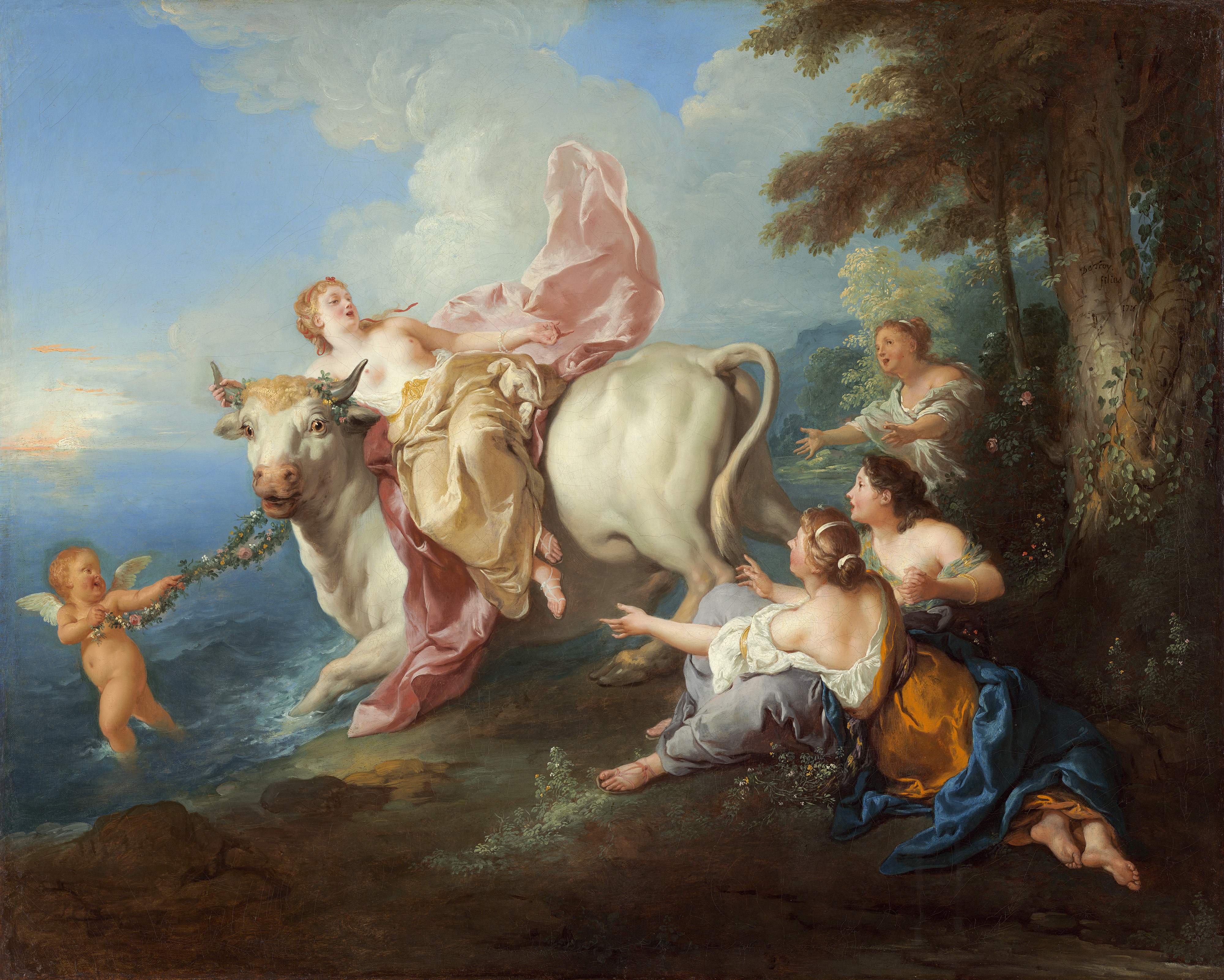The buck stops nowhere: it has conquered nearly all of Eurasia. The Modern English word refers to the stag. At one time, it was a synonym of he-goat, or Billy goat. But Old Engl. buc “stag” seems to have coexisted with bucca “Billy goat.” Perhaps later they merged. German Bock is a rather general designation of “male animal,” such as “ram” (or “wether”; wether is a nearly forgotten word, though still recognizable in bellwether), “stag,” and others; it is a common second element of compounds like Schafbock (Schaf “sheep”). Old Icelandic bukkr ~ bokkr also meant “ram.” Those who have read last week’s post on cow (Part 1 of the series) will immediately draw two conclusions. First: the word probably had a generic meaning, a male horned animal, with the specialized sense being the result of the more or less unpredictable narrowing of meaning. Second: bukkr ~ bokkr has a long consonant (a geminate), discussed a week ago in connection with Latin vacca “cow” (and in general, bokk– and vacc– sound rather similar) and may be an expressive word.

Also, last time a possible onomatopoeic origin of the Indo-European word for “cow” was discussed, and I wrote that, although moo– is what most people hear the cow “say,” other variants have often been recorded. One of such variants begins with b-. The bull’s warlike roar is different from the cow’s lugubrious mooing. In any case, the Lithuanian verb is būkti “to moo” (Latvian bucêt means “to sound; roar”), and Czech has býkati ~ búkati “to moo”; all of them begin with b-. When it comes to the animal name, in Slavic we find byk (and similar forms); in the Turkish languages, buka and buga; in Middle Irish bocc; in Avestan (an old Iranian language) būza; in Armenian, bowk ~ buc “lamb.” The Celtic form boukkô– means “cow,” for instance, Old Irish boc ~ bocc and Welsh bwyc ~ bwych. Vowels vary slightly, as often happens in sound-imitative words. If we are indeed dealing with a sound-imitative formation, then bock and its linguistic relatives need not be migratory words (a category, also mentioned last week); they are rather products of spontaneous word creation, as the distinguished Swiss linguist Wilhelm Oehl called such a process.
Incidentally, buck may go back to the Indo-European past, even if it was not sound-imitative. We should only remember that the oldest Indo-European words hardly ever began with a b, though in expressive and onomatopoeic words b did occur. Only the sound, reconstructed as bh was common; allegedly, it became b in Germanic by the First Consonant Shift, celebrated a week ago and many times earlier. A bold hypothesis connects our noun with the participle of the verb represented in English by bow “to bend,” from Old Engl. būgan (compare German biegen; its past participle is gebogen). According to this hypothesis, buck emerged as the name of an animal with bent horns. Such an etymology presupposes that the verbs, cited above, are derived from the animal name. The Indo-European word could spread to Turkic, or in one language family this word might be onomatopoeic, while in another it might derive from a participle like Modern German gebogen (from bhugno-).

To realize even more clearly how slippery our path is, we might look at Italian becco. There is becco “beak” and becco “Billy goat.” Engl. beak is of course a borrowing from Old French; all its Romance cognates derive from the Latin loanword beccus, which is of Celtic origin. Birds’ beaks can be bent, and we do find Old Irish bac “hook.” The Italian becco “Billy goat” is also in good company: compare French bouc (the same meaning), unless both are from Germanic; bique “Nanny goat,” and even biche “doe.” It is anybody’s guess whether becco1 and becco2 are related. All these words are of uncertain origin.
At one time, I discussed the etymology of Engl. bitch (11 May 2016) and mentioned in passing French biche “doe.” Etruscan, Caucasian, and Avestan sources have been offered for some of the above-mentioned words. Faced with this embarrassment of riches (embarras de richesses), one, naturally, begins to favor the onomatopoeic hypothesis or rely on a migratory word, though neither will explain all those animal names. Only one conclusion appears as certain: it is hard to be an etymological toreador.

In contrast to the multiple conjectures about buck, there used to be touching unanimity with regard to bull. In Old English, only the diminutive bulluc “bullock” (that is, “young bull”) has been recorded, with the suffix familiar from the modern word hillock and a few others, but in most cases, this suffix has merged with the root (as in mattock), and we can no longer isolate it. However, late Old English bula seems to have existed. And it was probably a native word, not a borrowing from Scandinavian. Even in Germanic, exact analogs of bull are few: Dutch bul and Old Icelandic bolli. Also, Lithuanian has bullus (native?). The animal’s name, our classic dictionaries suggest, has the same root as Engl. ball and Greek phallós “phallus.” Its meaning was reconstructed as “swollen.”
This etymology works very well for phallus; ball, as in football; and ball “testicle” (a round, “swollen” object). The bull was supposedly named for its function as a breeder, the bearer of its genital organ. But a word with such a solid Indo-European etymology could have been expected to turn up not only in Lithuanian and in part of Germanic (there is no German congener); it is a North Sea animal name. In any case, it would make more sense to interpret bull as a huge (“swollen”) animal rather than as a procreator. The editors of the OED online showed no enthusiasm for the traditional view. They didn’t even mention the phallus/ball etymology and preferred the sound imitative origin of bull. Unfortunately, the persuasive verbs that fit this agenda are few: only German dialectal bullen ~ büllen and possibly bellen “to bark.” The origin of very old animal names is usually beyond reconstruction, though the options are few.
Are we at the end of our journey? Oh, no, don’t forget steer and ox. Unlike the bull, those beasts are not potent, for both words most usually refer to castrated animals. A steer is typically a young ox. The family of both words is large. Dutch and German have stier ~ Stier, very probably related to Latin taurus and Classical Greek taurôs. We note that the last-named two words lack the initial consonant. Every now and then an enigmatic figure turns up in our stories. It is called movable s or s mobile. For the reasons that have never been discovered, words sometimes lose s at the beginning of the root. Here it is missing even in the Scandinavian cognate, for the Icelandic word is þjórr (þ = Engl. th, as in thigh). By the First Consonant Shift, Indo-European t became Germanic þ. This means that the protoform of þjórr did begin with t, as in taurus. (If someone has noticed that in steer and its likes, we have t, rather than þ, here is the answer: t was not shifted after s.)
All is fine, except that no one knows the etymology of steer. Even Gothic had this word (stiur “calf”), but, alas, so did Aramaic (tōr), Hebrew (šor), and Assyrian (šūru). Another migratory word? Perhaps. People drove their herds from one pasture to another, came into contact with their sometimes distant neighbors, and taught them the words they used. You remember what happened to Little Bo-Peep? We have a motley herd. Let us leave it alone for the time being and hope that the animals will come home and bring their tails and tales after. And ox? If I may, I will now imitate the great medieval German poet Gottfried, the author of Tristan, and finish my story so.—About ox I won’t tell you anything. –Oh, do tell us! –All right. Next time.

TOWARD THE SPELLING CONGRESS, LONDON, MAY 30, 2018
Some of our readers may be interested in what will happen after the congress. The Spelling Society will work with Expert Commissioners, not necessarily academics (just a group of people well-versed in spelling issues). Several, perhaps numerous, alternative spelling schemes will be offered, and the Commissioners will choose a few that will look especially promising. Those schemes will be widely discussed and eventually form the backbone of the reform. Changing English spelling is a delicate matter, and even a modest first step in the desired direction will be a stupendous achievement.
Featured Image: Bovine creatures are supposed to have a corresponding expression when staring at a new gate. They stop there, as it were. Featured Image Credit: “Cows Animals Farm Grass Fence” by Free-Photos. CC0 via Pixabay.



 toly Liberman is the author of
toly Liberman is the author of
Speaking of “buck,” a word with many meanings (including “buck” meaning “dollar,” based on a buckskin trading equivalent in the western U.S. in the early 1800s), here’s a possible antedating of “buck” somewhat but maybe not quite as used in the game of poker, here called by the forerunner of poker called “brag.”
“….The game had progressed for some time, when the ‘pot’ having been doubled and a ten dollar ‘buck’ had started, the brag had passed to the Colonel….”
Southern Sentinel, Plaquemine, Louisiana, Nov. 29, 1849 p. 1 col. 5.
For the full context, see:
https://chroniclingamerica.loc.gov/lccn/sn88064476/1849-11-21/ed-1/seq-1/#date1=1789&sort=date&date2=1963&searchType=advanced&language=&sequence=0&index=2&words=brag+buck&proxdistance=5&rows=20&ortext=&proxtext=brag+buck&phrasetext=&andtext=&dateFilterType=yearRange&page=1
Anatoly,
Much here on “bull” but nothing to “cow/chow” on!
Incidentally, always first to comment but last to be posted days later. Incidentally?
Kostas
In the Violet Fairy Book (1919) edited by Andrew Lang, is the Romanian folktale The Fairy of the Dawn. The hero battles with a Welwa, of which H.J.Ford drew a very fine illustration. Now I believe that walwa is hieroglyphic Luwian for a lion, something certainly unknown in Lang and Ford’s days.
Cuneiform Luvian for cow is wawi, according to http://www.palaeolexicon.com.
I think the word for bull was tarwas, just a metathesis away from the Greek.
In Australia and New Zealand the ‘wether’ is far from forgotten: it is a castrated male sheep. Castration is commonly practiced when the animal is raised to be eaten.
Anatoly,
This may be of interest re:”bull”
There is another word in Greek for “bull” besides “taurus”.
“Vuvally”
Greek “beta” has the “v” sound, as you likely know. Thus we have “bubally”. Which comes close to “bufallo”. And with the double “buba” contracted to a single “bu” while the grammatical gender ending “y” dropped, we easilly get “bull”.
What do you think?
Kostas
(addendum to previous post)
The Greek root here is “bous”. From which we get “boidi” (cow) and “boskos” (herdsman). As well as the previous “bubally” which contracts in English to monosyllabic “bull”.
Add that to all the “bull” discussion.
Kostas
What about German “Bulle”, borrowed?
Quick theory: the swell root *bhel is rather similar to *bher, whence boil. A relation seems reasonable, because boiling water bubbles and swells. Anyhow, the word warm is of uncertain origin, with *gwher and *wer proposed, and I think that’s closenenough to propose “bull” being connected to the Ger. “Warmblüter”, which is used to describe horse breeds (akin to “Vollblut” – fullblood). *ghwer- then would or wouldn’t fit Slav. “gvos”?
Previously, Ben Zimmer reported a use of “pass the buck” allusively associated with poker in a book from 1856. [The Conquest of Kansas: By Missouri and Her Allies, p. 303]
Here is a “pass the buck” use in a Nov. 1, 1856 newspaper story (copying an earlier one), with the phrase associated with the game of brag (brag maybe being an earlier English-attested game name than poker, also sometimes spelled, btw, pocre). From Weekly Bulletin, San Francisco:
This amusing operation is conducted with all the apparent earnestness attention that ever as many an old “brag” player bestowed on a game for “five dollars ante, and pass the buck.” –Butte Record (Oroville.)